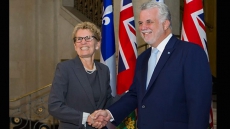VANCOUVER - British Columbia's long-warring government and teachers' union have made unprecedented educational labour peace with a six-year collective agreement wrought through months of embittered strike action and a final six-day sprint to settlement.
The historic deal, if ratified by teachers in a vote on Thursday, will reopen schools next week for half a million students, restore the flow of income to more than 40,000 teachers and renew stability for families provincewide.
A breakthrough in negotiations came with the aid of respected mediator Vince Ready just before 4 a.m. Tuesday.
The result is a tentative contract that includes a 7.25 per cent salary increase over six years, as well as the creation of a $400-million education fund that will be used to hire additional teachers to address class size, class composition and the provision of specialist teachers, states a document sent to members Tuesday night.
The document says the education fund will begin this academic year and end in the 2018 to 2019 academic year.
Premier Christy Clark beamed and patted Education Minister Peter Fassbender on the back as she thanked students and parents for their patience, and lauded union president Jim Iker for showing "real courage."
"I think it's a real game-changer for education in the long-term," Clark told reporters in Vancouver, adding it's an opportunity to reset a 30-year dysfunctional relationship with the union.

"We will now be able to sit down with some of the most important people in the system — and that's teachers — and work together, rather than constantly arguing and fighting."
The premier said the deal doesn't require any tax hikes, although the province will continue to appeal a court case a judge has already decided in favour of the union's right to bargain class size and composition.
That dispute dates back to January 2002, when the provincial government imposed a contract on teachers and remove hundreds of provisions related to class size and class composition from the teachers' collective agreement, while also prohibiting those issues from being part of future negotiations.
In April 2011, a B.C. Supreme Court judge ruled the 2002 legislation removing class size and composition from bargaining was unconstitutional. The court ruling restored the deleted provisions and gave the government one year to come up with a fix.
In January 2014, a B.C. Supreme Court judge again ruled the provincial government violated teachers' collective bargaining rights by removing clauses related to class size and class composition and by prohibiting those issues from being negotiated. The ruling also awarded the union $2 million.
The government filed an appeal in April.

A document sent to BCTF members from the union Tuesday says the $400-million education fund is subject to a final ruling on that case.
"If the 2002 language is fully or partially restored the parties will reopen the collective agreement on this issue and will bargain from the restored language," says the document.
It says the education fund provisions will continue until there is agreement on implementation and, or changes to the restored language.
Iker, who's acted as chief negotiator during the lengthy and heated dispute, addressed the B.C. Teachers' Federation before the document was sent out and urged union members to vote Yes.
"You've worked hard, you've persisted, and you've been courageous," he said in a live-streamed news conference watched by thousands. "I know the last few months have been tough. But it was our collective effort that made today possible."
Along with improvements in salary and extended health and dental benefits, the deal strikes out the contentious E80 clause around class size and composition, Iker said.

He expressed hope the deal will lay a new path towards mending the union's tumultuous rapport with the province.
"We'll also work hard to see if we can start developing a better relationship with this government and any government."
Administrators anticipate that Monday would be the earliest schools could open, but boards will make their own decisions, likely resulting in a staggered start to the fall term.
Vancouver School Board chairwoman Patti Bacchus said if the contract is approved, the board will launch classes as quickly as possible. Principals have already been making preparations, she said.
"We're fairly well-prepared," Bacchus said, adding many teachers still have to tidy up from June because the strike began two weeks before summer break.
"It's going to be bumpy for sure and people are going to have to be a little bit patient, but I know there's a great desire to get back."
Education Minister Peter Fassbender said the ministry was working with superintendents to make up the lost time, with a special emphasis on ensuring Grade 11 and 12 students' needs will be accommodated. Iker panned the cancellation of professional development days as a route to the remedy.

Ig Cheung, a long-time teacher in Surrey, said he's relieved by the negotiated agreement and intends to read it closely before deciding on his vote.
"I'm just hoping we haven't given up too much," he said.
Chung said that with morale waning on the picket lines, he's not certain all his colleagues will return to the job wholeheartedly.
"This is going to be a very different year," he said. "Some teachers, after all this, may just go and teach. They (will) forego extracurriculars like running clubs, coaching teams."
Representing parents, Nicole Makohoniuk, president of the B.C. Confederation of Parent Advisory Councils, said the body wants future negotiations to begin well in advance of the contract's expiry date. She hopes that will help speed the healing process.
"B.C. still has the top education program, in my opinion, in Canada. I think (teachers) move forward," she said. "They move on. Yes, they're hurt, and yes, they forgive, but they don't forget. That's the biggest thing."
Grade 12 student Queena Zeng said she expects everyone is feeling overwhelmed, but she's optimistic that moods will brighten once classes get into gear.
"At the end of the day, everyone has to try to get back together," she said. "It's not just the teachers, but also the students and the admin. Everyone working together."

Talks resumed last week as a group of unions offered $8.5 million in loans and donations to struggling teachers, while the government softened its opposition to back-to-work legislation.
B.C. governments of all political affiliations have struggled with the BCTF for control over educational policy for decades, resulting in the present-day work stoppage that takes the title of longest provincewide strike in its history.





